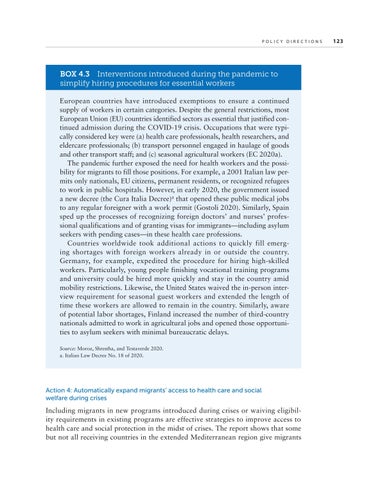P o l i cy D i r e c t i o n s
BOX 4.3 Interventions introduced during the pandemic to simplify hiring procedures for essential workers European countries have introduced exemptions to ensure a continued supply of workers in certain categories. Despite the general restrictions, most European Union (EU) countries identified sectors as essential that justified continued admission during the COVID-19 crisis. Occupations that were typically considered key were (a) health care professionals, health researchers, and eldercare professionals; (b) transport personnel engaged in haulage of goods and other transport staff; and (c) seasonal agricultural workers (EC 2020a). The pandemic further exposed the need for health workers and the possibility for migrants to fill those positions. For example, a 2001 Italian law permits only nationals, EU citizens, permanent residents, or recognized refugees to work in public hospitals. However, in early 2020, the government issued a new decree (the Cura Italia Decree)a that opened these public medical jobs to any regular foreigner with a work permit (Gostoli 2020). Similarly, Spain sped up the processes of recognizing foreign doctors’ and nurses’ professional qualifications and of granting visas for immigrants—including asylum seekers with pending cases—in these health care professions. Countries worldwide took additional actions to quickly fill emerging shortages with foreign workers already in or outside the country. Germany, for example, expedited the procedure for hiring high-skilled workers. Particularly, young people finishing vocational training programs and university could be hired more quickly and stay in the country amid mobility restrictions. Likewise, the United States waived the in-person interview requirement for seasonal guest workers and extended the length of time these workers are allowed to remain in the country. Similarly, aware of potential labor shortages, Finland increased the number of third-country nationals admitted to work in agricultural jobs and opened those opportunities to asylum seekers with minimal bureaucratic delays. Source: Moroz, Shrestha, and Testaverde 2020. a. Italian Law Decree No. 18 of 2020.
Action 4: Automatically expand migrants’ access to health care and social welfare during crises
Including migrants in new programs introduced during crises or waiving eligibility requirements in existing programs are effective strategies to improve access to health care and social protection in the midst of crises. The report shows that some but not all receiving countries in the extended Mediterranean region give migrants
123

